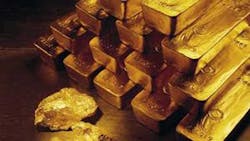Cornstarch May Provide Green Method to Extract Gold
Scientists said Tuesday they have found a way to extract gold from ore using a seemingly unlikely pantry item -- cornstarch.
Traditional leaching employs poisonous cyanide to dissolve and extract the gold locked up in mineral ore -- but the method is polluting and controversial.
Despite being banned in several countries, it is still used to extract more than 80% of gold around the world.
Now an international team of scientists said they have accidentally stumbled upon an alternative while doing simple test tube chemistry experiments.
One of the team, Zhichang Liu, mixed a sugar named alpha-cyclodextrin, which is derived from cornstarch, with dissolved gold salt in the hopes of creating some sort of three-dimensional cubic structure.
Though initially disappointed when his experiment failed, Zhichang soon realized he may have discovered something potentially more lucrative, according to the study published in Nature Communications.
Green Magic
"Zhichang stumbled on a piece of magic for isolating gold from anything in a green way," wrote the team.
"We have replaced nasty reagents with a cheap, biologically friendly material derived from starch."
The method could, for example, be used to remove gold from consumer electronic waste -- a potential boon with gold prices having increased fourfold over the last decade.
Several spills have been recorded over the years from mining sites that use cyanide leaching -- putting human lives and the environment at risk.
While Europe allows the use of cyanide in mining, some countries like Germany, Czech Republic and Hungary have outlawed it and in 2010, the European Parliament called for these national bans to extend to the continent as a whole.
"The elimination of cyanide from the gold industry is of the utmost importance environmentally," study leader Fraser Stoddart of Northwestern University's chemistry department said.
The new alternative, alpha-cyclodextrin, is "very cheap and easy to handle," he told AFP.
"The most important thing is the immeasurable environmental benefit for us and future generations."
Copyright Agence France-Presse, 2013
About the Author
Agence France-Presse
Copyright Agence France-Presse, 2002-2025. AFP text, photos, graphics and logos shall not be reproduced, published, broadcast, rewritten for broadcast or publication or redistributed directly or indirectly in any medium. AFP shall not be held liable for any delays, inaccuracies, errors or omissions in any AFP content, or for any actions taken in consequence.
